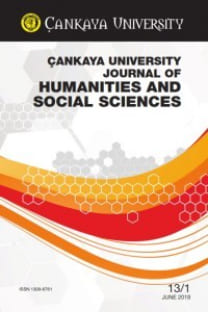Dünya Sakini Hayvanın Dünyadan Dışlanması: Orta Çağ Mister Oyunlarında Hayvanların Temsili
Batı metafizik felsefesine göre, insan türünün hayvanlardan, ikamet ettiği alan, vücut yapısı, bir zihne sahip olması, düşünebilmesi, kendine özgü komplike bir dilinin olması, acı çekip ölebilmesi bakımlarından üstün olduğu kabul edilmiştir. Böyle bir yaklaşım, insanların hayvanları temel, doğuştan getirdikleri, yaşamak gibi belli haklardan yoksun bırakmalarına yol açmıştır. Fakat, güncel araştırmalara ve felsefi/etik tartışmalara bakıldığında, bir insan üstünlüğünden bahsetmek söz konusu değildir. Bu çalışma, hayvan çalışmaları alanında yapılan ve Batı’nın metafizik düşüncesini çürüten belli araştırmalar üzerinde duracaktır. Söz konusu hayvan araştırmalarından özellikle Stacy Alaimo, Karen Barad, Jacques Derrida, Michael Allen Fox & Lesley McLean, Peter Singer ve Cary Wolfe tarafından yapılan çalışmalara göndermede bulunacaktır. Bu çerçevede, orta çağ Britanyası’nda, Eski Ahit’teki hikayelerden esinlenerek yaratılan ve sahnelenen mister oyunlarındaki antroposantrik hayvan betimlemelerini inceleyecektir. Fakat aynı zamanda, bu oyunlardaki akleden, konuşan, yaşayan ve saygı duyulan hayvan portrelerine dikkat çekerek, içerisinde Tanrı’nın insana hakimiyet bahşettiği Eski Ahit etkisinde üretilmiş olsa da orta çağ İngiliz mister oyunlarının hayvan dostlarımızla barışçıl bir hayat çağrısında bulunduğunu gösterecektir.
Anahtar Kelimeler:
hayvan çalışmaları, Batı metafizik felsefesi, Mister oyunları, Eski Ahit, Orta çağ Britanyası
The Animal In-Habitant Made an Out-Sider: Representation of Animals in Medieval Mystery Plays
According to the Western metaphysical philosophy, human species is supposed to be superior to the nonhuman animals with respect to the former’s physical space, bodily form, possessing mind, being able to reason, having a distinctive and complicated language as well as being susceptible to pain and death. Such kind of an approach encourages humans to deny animals some basic intrinsic rights, such as living. However, as far as the recent research and philosophical/ethical discussions point out, human superciliousness is out of question. This study will dwell upon certain research made in the field of animal studies that refute the assumptions of Western metaphysical thought. It will refer, among others, particularly to the research conducted by Stacy Alaimo, Karen Barad, Jacques Derrida, Michael Allen Fox & Lesley McLean, Peter Singer and Cary Wolfe. Then, within this context, it will denote the anthropocentric representations of animals in the mystery plays, which were created and performed in medieval Britain out of the stories in the Old Testament. But at the same time, it will draw attention to a number of rational, talking, living, respected animal portraits in these plays and assert that medieval English mystery plays, though produced under the influence of the Old Testament in which God announces human beings’ ascendance, call forth a harmonious life with our animal companions.
Keywords:
Animal studies, Western metaphysical philosophy, Mystery plays, Old Testament, Medieval Britain,
___
- Adams, Carol J. The Sexual Politics of Meat: A Feminist-Vegetarian Critical Theory. Continuum, 2010.
- Alaimo, Stacy. “Trans-Corporeal Feminisms and the Ethical Space of Nature.” Material Feminisms, edited by Stacy Alaimo and Susan Hekman, Indiana UP, 2008, pp. 237-264.
- Barad, Karen. Meeting the Universe Halfway: Quantum Physics and the Entanglement of Matter and Meaning. Duke UP, 2007.
- Bleeker, Maaike. “Guest Lecture.” The Thinking Body, 19 Nov. 2020, Utrecht University. Online Lecture.
- Bradshaw, Gay A. “An Ape Among Many: Animal Co-Authorship and Trans-species Epistemic Authority.” Configurations 18 (2010): 15–30.
- Braidotti, Rosi. Posthuman Feminism. Polity, 2022.
- Castricano, Jodey, ed. Animal Subjects: An Ethical Reader in a Posthuman World. Wilfrid Laurier UP, 2008.
- Coetzee, John Maxwell. The Lives of Animals. Princeton UP, 1999.
- Derrida, Jacques. The Animal That Therefore I Am, edited by Marie-Louise Mallet. Fordham UP, 2008.
- English Mystery Plays: A Selection. Ed. Peter Happé. Penguin, 1975.
- Fox, Michael Allen and Lesley McLean. “Animals in Moral Space.” Castricano 145-174.
- Frantzen, Allen J. “Tears for Abraham: The Chester Play of Abraham and Isaac and Antisacrifice in Works by Wilfred Owen, Benjamin Britten, and Derek Jarman.” Journal of Medieval and Early Modern Studies 31 (2001): 445-476.
- Genesis. Bible, King James Version. https://quod-lib-umich-edu.proxy.library.uu.nl/ cgi/k/kjv/kjvidx?type=citation&book=Genesis&chapno=1&startverse=26&endverse=31. Accessed 9 March 2022.
- McLaughlin, Ryan Patrick. “A Meatless Dominion: Genesis 1 and the Ideal of Vegetarianism.” Biblical Theology Bulletin 47.3 (2017): 144-154.
- Merleau-Ponty, Maurice. The World of Perception. Trans. Oliver Davis. Routledge, 2004.
- Nagel, Thomas. Mortal Questions. Cambridge UP, 2002.
- Noë, Alva. Action in Perception. MIT, 2004.
- Shannon, Laurie. “Invisible Parts: Animals and the Renaissance Anatomies of Human Exceptionalism.” Animal Encounters, edited by Tom Tyler and Manuela Rossini, Brill, 2009, pp. 137-157.
- Singer, Peter. Animal Liberation. Avon Books, 1990.
- Singer, Peter. “Becoming a Vegetarian….” Cooking, Eating, Thinking: Transformative Philosophies of Food, edited by Deane W. Curtin and Lisa M. Heldke. Indiana UP, 1992, pp. 172-193.
- Westling, Louise. “Merleau-Ponty’s Human–Animality Intertwining and the Animal Question.” Configurations 18 (2010): 161–180.
- Wolfe, Cary. (2008) “Thinking Other-Wise.” Castricano, 125-143.
- ISSN: 1309-6761
- Yayın Aralığı: Yılda 2 Sayı
- Başlangıç: 2004
- Yayıncı: Çankaya Üniversitesi
Sayıdaki Diğer Makaleler
Travma Geçirmiş Göçmen: Monica Ali’nin Brick Lane’i
William Golding’in The Inheritors Romanında Bireyleşme Süreci: Duygulanım ve “Öteki”yle Karşılaşma
Post-editing Eğitimi, Acemi Post-editörlerin Performansını Etkiliyor mu? Deneysel Bir Çalışma
Volkan DEDE, Elena ANTONOVA-ÜNLÜ
Gottfried Benn Şiiri ve Dışavurumcu İmge
Kadın Dergilerinde Tavsiye Yazıları
Reem LULU, Sharifah Nurul Huda ALKAFF
Yasak Olanın Bedeli ve Hayatın Değeri
Dünya Sakini Hayvanın Dünyadan Dışlanması: Orta Çağ Mister Oyunlarında Hayvanların Temsili
